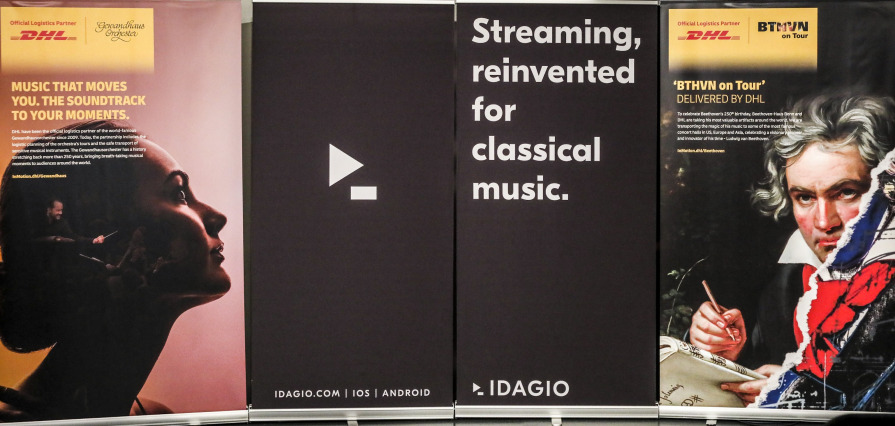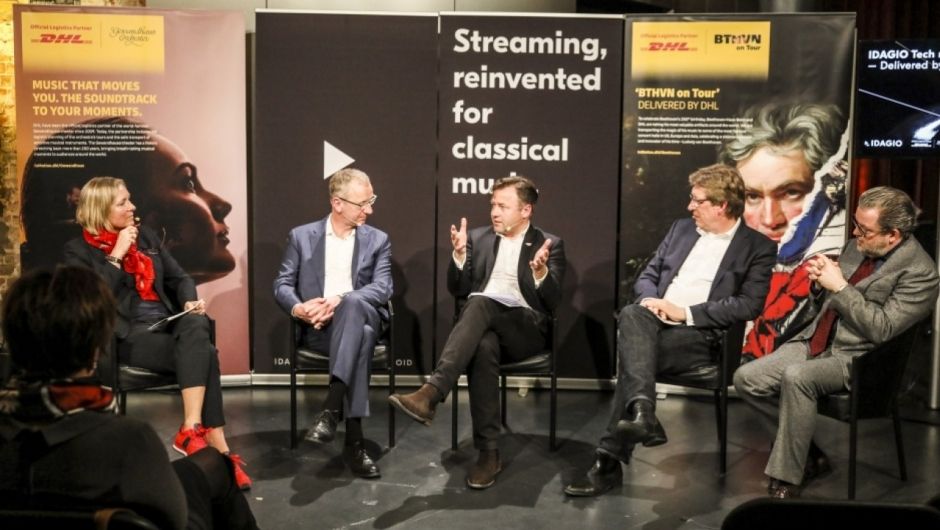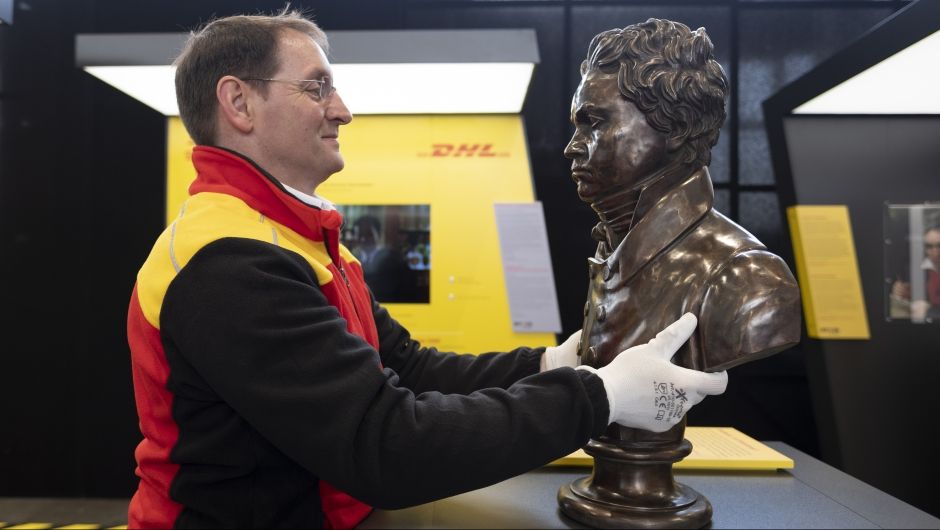BTHVN on Tour
“There are many similarities between innovation in the arts and technology”
Key Takeaways
- Beethoven was a radical innovator as a composer
- IDAGIO is a state-of-the-art classical music platform
- A podium discussion demonstrated the perfect fit of DHL, BTHVN on Tour, Gewandhausorchester and IDAGIO
In Berlin on an evening in early April, “BTHVN on Tour – Delivered by DHL“ had a unique opportunity to clearly demonstrate exactly how the magic of the travelling exhibition perfectly fits with the modern digital age. DHL partnered with the classical music streaming platform IDAGIO to present the video-streamed live event ‘IDAGIO Tech meets Culture – Delivered by DHL’ dedicated to Beethoven’s musical genius. It opened with an exclusive performance by the Gewandhaus-Quartett of a selection of Beethoven’s String Quartets for an invited live audience. That was followed by an engaging and informative discussion led by the well-known German journalist and author Inge Kloepfer centering on Ludwig van Beethoven’s pioneering spirit and the innovation he introduced to the world of classical music.

IDAGIO - a new way of listening to classical music through online music streaming.
On stage were representatives of four primary pillars that have joined their resources to celebrate the 250th anniversary of Beethoven’s birth. A longtime, highly experienced and trusted logistics partner of Leipzig’s Gewandhausorchester, DHL is responsible for transporting seven tons of priceless and irreplaceable historical artifacts from Beethoven-Haus Bonn to more than ten classical music venues on four continents over the next two years.
For the podium discussion Arjan Sissing, Head of Brand Marketing represented Deutsche Post DHL Group. Professor Andreas Schulz, Director of the Gewandhaus, Malte Boecker, Director of Beethoven-Haus Bonn and Till Janczukowicz, founder and CEO of IDAGIO (below) completed the panel.

Addressing how people today are changing the ways they consume media, Inge Kloepfer asked the panelists about the concepts of innovation and disruption in terms of culture. She posed the question: In 1819, Beethoven wrote a letter to Archduke Rudolph in which he said “Art challenges us to never stand still”. What does that mean for us today?
“I think it’s innovation. And there are many similarities between innovation in the arts and innovation in technology because it challenges the past while at the same time learning from it,” responded IDAGIO’s Till Janczukowicz. “And innovation today comes from technology. I believe that Beethoven would have loved this development because it is empowerment of the individual. Look at society: everything is becoming transparent today, meaning that you can’t fool people so easily anymore.”
“Until about ten years ago, I was very technology averse when it came to music,” he admitted. “I believed that a concert had to be experienced live to achieve the full communication between the musicians and the audience. Then, I was in San Francisco and rode in an Uber for the first time and asked the driver why he chose Uber instead of driving a taxi and his answer was, “It empowers me to conduct my business the way I want,” which is a kind of liberation. And that’s what online platforms do, too, by connecting supply and demand in a totally new way. That is changing markets in a very powerful manner – positively and negatively.”
With another perspective, Malte Boecker of Beethoven-Haus-Bonn (below) added, “We had a discussion at the Beethoven-Haus about who could be the Beethoven of today and I am willing to bet that it would not be someone that we would consider to be a serious classical composer. It would be someone who revolutionizes the way we listen to music – I like to say along the lines of David Bowie reinventing pop music.”

Gewandhausorchester and Beethoven
For many years, DHL has partnered with the Gewandhausorchester – the world’s largest professional orchestra – meeting all of its highly demanding logistics needs. This specialized expertise is one important reason why Beethoven-Haus Bonn decided to work with DHL on ‘BTHVN on Tour’ as well. Inge Kloepfer noted that the Gewandhausorchester in Leipzig has quite an impressive Beethoven tradition and asked Andreas Schulz why Beethoven is still considered so up-to-date and especially why his orchestra still plays the great composer’s works?
“The Gewandhausorchester performed the first Beethoven Cycle in the world in the 1825/26 season, when Beethoven was still alive,” said Schulz with pride. “And ever since then every Gewandhausorchester Kapellmeister has performed all of Beethoven‘s symphonies and all of his string quartets every 2 - 3 seasons. You could say that it is part of our DNA. The members of the orchestra never get tired of performing Beethoven’s works, because there is always something new to discover – new aspects, new interpretations, both by the performers and audiences alike. It is never a standard repertoire; Beethoven has always been a central point in the artistic planning of the orchestra and is still relevant to Gewandhausorchester, because it is our heritage that we are carrying on into the future.”

In order to continue to attract new and younger audiences to its Beethoven concerts the Gewandhausorchester considers two primary aspects, according to Andreas Schulz (above). This approach keeps classical music attractive and demonstrates its importance.
“The first aspect is what we offer in addition to the concert itself, when the musicians perform their repertoire,” he said. “For instance, we provide an introduction for the works we will be presenting, or stories that add context – about the composer, his work, his lifetime, the musicians, etc. The other is to consider how we can present Beethoven in a new and challenging way and not merely play his symphonies. For example in the next season, our current Kapellmeister (Music Director) Andris Nelsons has decided to present combinations of works by Felix Mendelssohn Bartholdy and Beethoven.”
“We all know that Beethoven’s Ninth Symphony begins with three movements of only orchestral music before the chorus and four soloists come in. But, then look at Mendelssohn’s Second Symphony, the Symphony Cantata, which is composed in the same way,” explained Schulz. “This is important because we need to give people who otherwise won’t attend a Gewandhausorchester concert an opportunity to discover something they did not know. The orchestra already has 12,500 subscribers, but we know that most of them are in their 60s or older. So we work to attract younger people – not just children or teens, but adults as well – by telling interesting stories about the music and its composers – things that are important for them and for their lives.”
“We need this music on mobile phones”
In our modern digital world in which we are constantly flooded with thousands of alternatives for our time and attention, Inge Kloepfer closed the panel discussion by asking Till Janczukowicz somewhat controversially how can Beethoven possibly compete with “Breaking Bad”?
“For me the question is, ‘What is our job?’, meaning people like us, who care for this music because the music is eternal,” answered the IDAGIO CEO. “I ask myself, how do we cope with this situation in a time when everything is constantly and so quickly changing? How can we convey a sense of what time meant when Beethoven was alive? Time itself was experienced totally differently and communications were different from today.”

“With IDAGIO we are by bringing classical music into this new environment. It may sound like a marketing slogan, but we believe the answer is turning every mobile phone into a classical music collection,” asserted Janczukowicz. “Digitally, we bring the music of Beethoven as close as possible to people in 180 countries. This is a case where technology adds the opportunity and music does the job. Across the world, classical music has never been so popular, so it’s definitely not a crisis of content, it’s a question of changing the packaging. There’s a nice analogy I heard: If you want to save the newspaper business, remove the word ‘paper’. A famous classical musician from Asia told me recently, “We need this music on mobile phones. I can’t reach the young generation if I can’t communicate through these tools.”
Almost inevitably, the question of Beethoven’s personal relevance in our modern world was also raised and DPDHL Group’s Arjan Sissing (above) expressed absolutely no doubts. “Beethoven and DHL are examples of ‘brands’ that are borderless, know no boundaries and rely on innovation as their key to success,” he said without hesitation. “This can be seen in the way we handle the shipping of these priceless and irreplaceable Beethoven exhibits – monitoring them with Smart Sensors and GPS live tracking systems. Even if some people might consider classical music a niche commodity, Beethoven is a really big global player.”




Content from disqus has been blocked because you did not allow to load it.
Loading the blocked content will adjust your privacy setting and content from this service will not be blocked in the future.
You have the right to revoke or change your decision at any time.
Posting Guidelines
All communications on Logistics of Things should be appropriate for a professional community, respecting the diverse views of individuals from different backgrounds. We will review all comments and reserve the right to terminate or restrict access to user's account and to delete any content posted through it, without notice and at our discretion, if we deem it to be overly promotional, offensive, or off topic.
All posting become property of DHL.